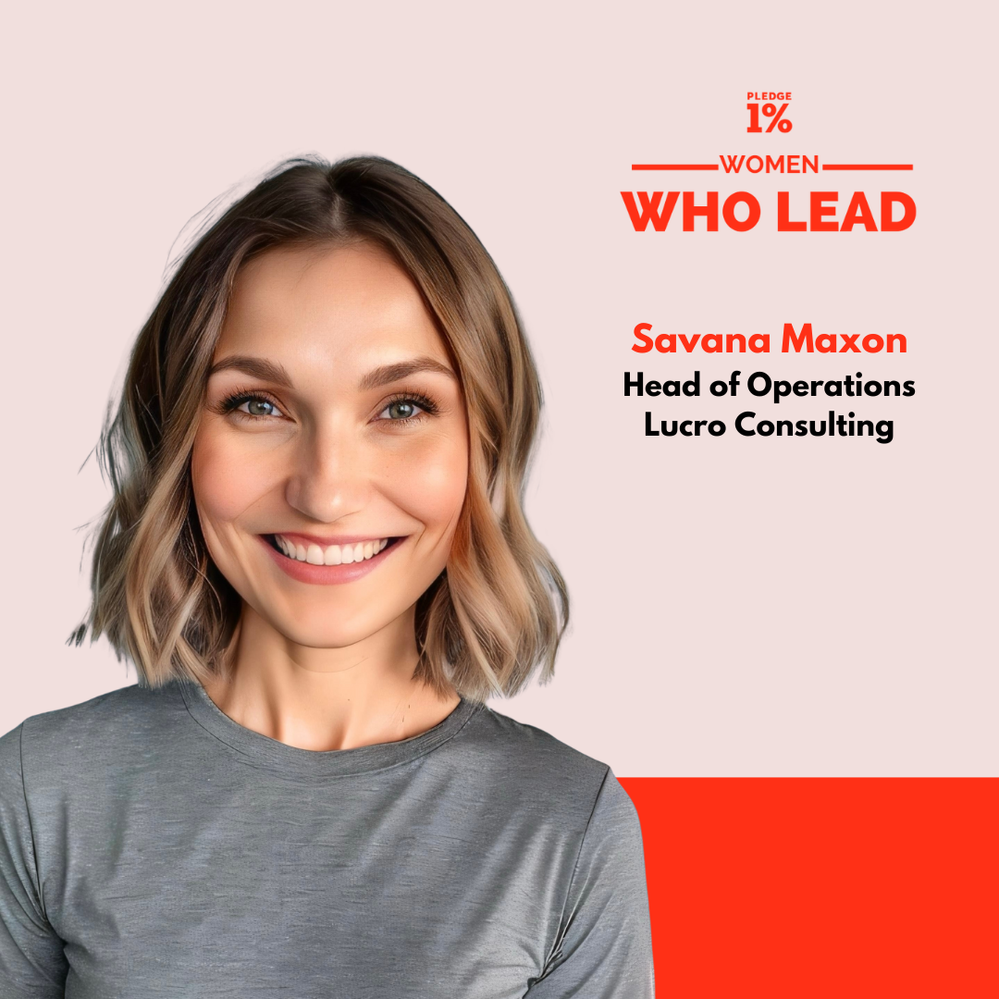
Savana Maxon
Head of Operations, Lucro Consulting
Boise, Idaho
If you could describe yourself in one word, what would that be and why?
Resilient. My journey, marked by overcoming personal adversity, has sculpted me into a resilient individual. Growing up as a survivor of abuse and a former ward of the state, I faced significant challenges. However, each obstacle served as a stepping stone, fortifying my determination and adaptability. For instance, volunteering at FACES Family Justice Center allowed me to channel my resilience into coordinating events and providing child care services, fostering hope and resilience within the community.
Pledge 1% provides a framework for businesses to do good. Do you think it’s important for today’s corporate leaders to prioritize social impact? If so, why?
Absolutely, prioritizing social impact is crucial for today’s corporate leaders. Beyond contributing to the greater good, it establishes a positive corporate culture and fosters employee engagement. Socially responsible practices enhance brand reputation and create a sense of purpose within the workforce. It aligns businesses with the values of conscious consumers, promoting long-term sustainability.
Do you give back to the community with your team and work? If so, what does this look like?
Yes, giving back is integral to my professional philosophy. At HR Association of Treasure Valley (HRATV), I advocate for and contribute to workforce entry programs for individuals in the foster system. Additionally, my involvement with Meridian Canine Rescue as a board member reflects my commitment to the community’s well-being. One specific experience is coordinating events and providing child care services at FACES Family Justice Center, contributing to the holistic support of survivors. My enrollment in Go Lead Idaho further amplifies my commitment to community impact by providing strategic governance and leadership.
In alignment with my dedication to community service, I am actively engaged with Go Lead Idaho, a nonprofit organization with a mission to motivate women to lead and demonstrate why it matters. Their vision is a state where contributions of women are valued and respected, and more women are influential and visible leaders. Go Lead Idaho fosters women as leaders by providing training, networking, mentoring, and professional and community leadership opportunities. Additionally, it advocates for more women in leadership by engaging partners, publicizing women’s success, and raising awareness of the value of women in leadership. Go Lead Idaho also develops alliances with individuals and organizations to ensure financial viability and increase the visibility of their mission. This alignment with Go Lead Idaho’s mission and strategic goals further emphasizes my commitment to empowering women and contributing to positive leadership development within the community.
What’s the best piece of advice you’ve ever received?
The most profound advice I’ve ever received mirrors the essence of sonder – the realization that each passerby is living a life as vivid and complex as my own. In embracing this perspective, I’ve learned the power of empathy, understanding, and the interconnected nature of our human experiences. The wisdom lies in acknowledging the depth within every individual, fostering a world where compassion and appreciation for the unique narratives of others become guiding principles.
This year’s International Women’s Day themes are focused on investing in women and inspiring inclusion. What can we do to make today’s workplaces more equitable and inclusive for women?
To foster workplace equity and inclusion, it’s crucial to implement mentorship programs that pair experienced professionals with women entering the workforce. Additionally, creating a culture that values diverse voices and perspectives, offering equal opportunities for career development, and addressing the gender pay gap are vital steps. Leadership training programs focused on eliminating biases can contribute to a more inclusive environment. Encouraging open dialogue about workplace challenges and celebrating achievements can further create a supportive and empowering atmosphere.
What advice do you have for women who are just starting their career?
For women embarking on their careers, I encourage them to be fearless in pursuing their goals. Cultivate a network of mentors who can provide guidance and support. Embrace challenges as opportunities for growth, and don’t shy away from showcasing unique strengths. Speak up, be assertive, and believe in your abilities. Success often comes from the courage to step outside your comfort zone.
Speak up, be assertive, and believe in your abilities.
What are you looking forward to this year? Are there any goals (personal or professional), activities, or experiences you are excited about?
I am eagerly anticipating the release of the book “Lead Like a Woman – Tenacity,” which I co-authored. Professionally, I look forward to further contributing to Lucro and all of my clients’ success and making a positive impact on organizational outcomes. My enrollment in Go Lead Idaho offers an exciting opportunity to enhance my leadership skills and broaden my network. Personally, I am excited about continued involvement in community initiatives and witnessing the positive change they bring.
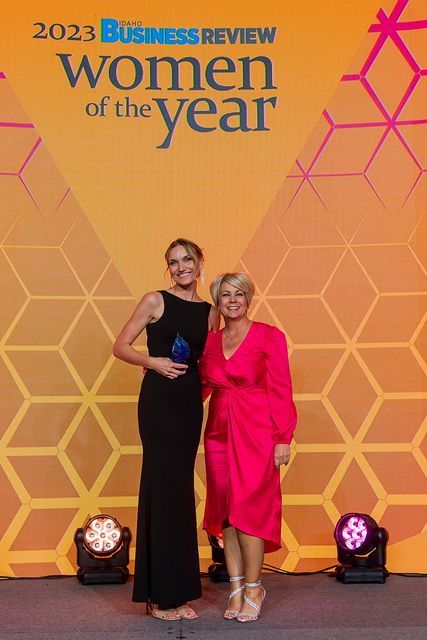
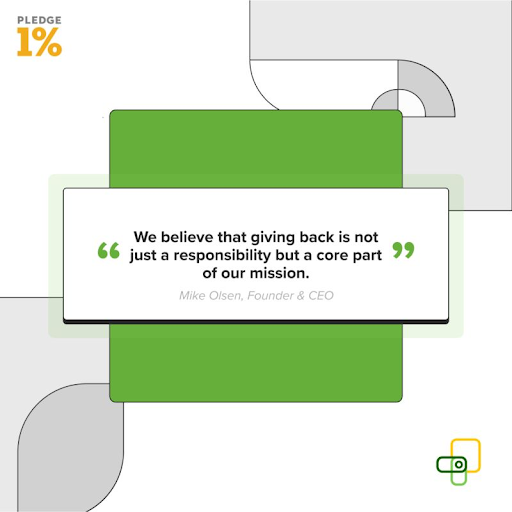
Original article here
Author: Proctorio
Proctorio announced today that it has joined Pledge 1%, a global movement to create a new normal for companies of all sizes and stages to have a positive social impact through their business. Proctorio is joining over 18,000 companies around the world who have committed to Pledge 1% of company resources. We are proud to announce our commitment to donate 1% of time to the local community.
Proctorio is dedicated to philanthropy through initiatives that support educational access and digital equity, aiming to bridge the gap for underserved communities. Our commitment extends to partnering with organizations that focus on expanding learning opportunities and providing resources to those in need. Since the beginning, Proctorio has helped over 52 charities with a growing employee participation rate of 83%, making a $550,000+ impact on the community to date. We aim to hit our 1% goal of 1,430 volunteer hours by the end of 2025, and hope to continuously increase our goal as the years go on.
“At Proctorio, we believe that giving back is not just a responsibility but a core part of our mission. By pledging 1% of our time, we’re investing in the communities that have supported our growth while allowing us to increase opportunities for education in ways that align with our values. We’re honored to be part of this global movement and look forward to seeing what we can accomplish together.” – Mike Olsen, Founder & CEO of Proctorio
Proctorio is proud to join the Pledge 1% community and encourages other companies to take the pledge and leverage their business as a force for good.
To learn more about Proctorio’s program, visit https://proctorio.com/about/sustainability or contact press@proctorio.com.
ABOUT PLEDGE 1%
Pledge 1% is a global movement that inspires, educates, and empowers every entrepreneur, company, and employee to be a force for good. Over 18,000 members in 100+ countries have used Pledge 1%’s flexible framework to ignite half a billion dollars in new philanthropy. To learn more about Pledge 1% and to take the pledge, visit www.pledge1percent.org.
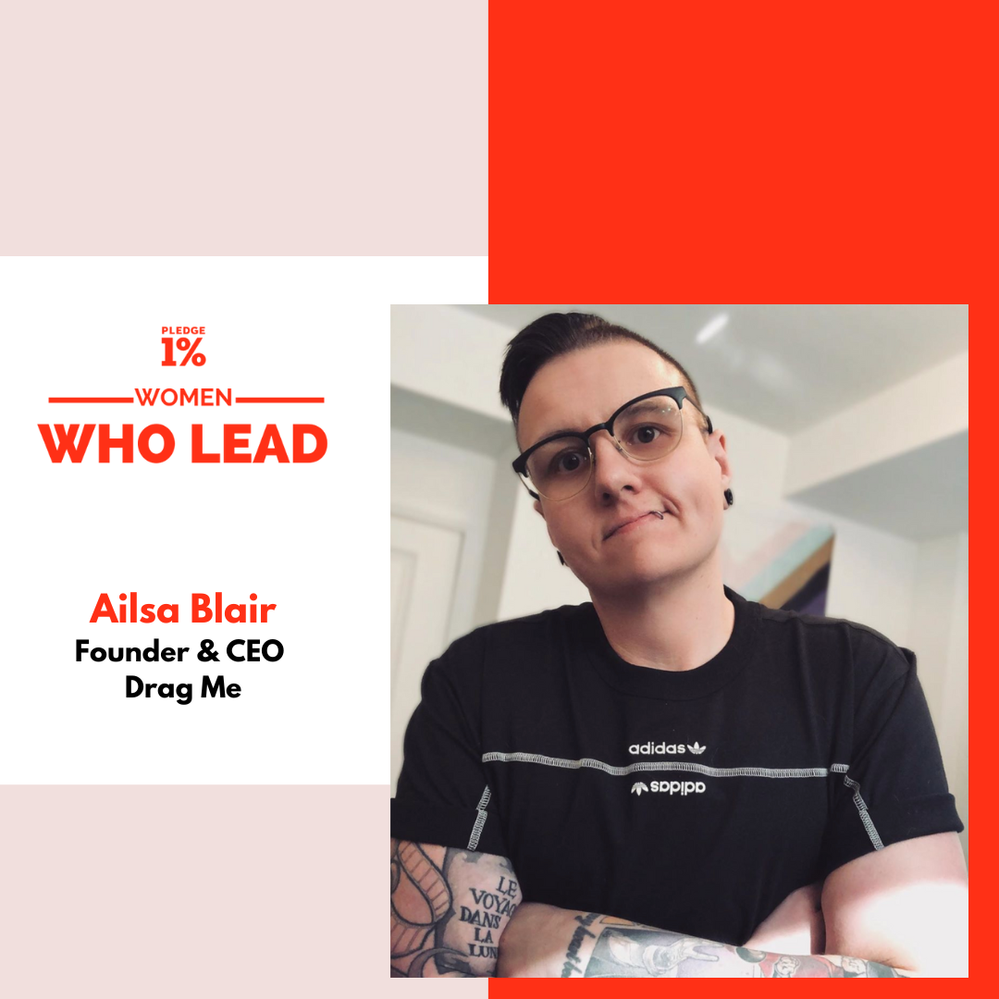
Ailsa Blair
Founder & CEO, Drag Me
Vancouver, BC (CA) & Dover, DE (US)
If you could describe yourself in one word, what would that be and why?
Empathetic – other people’s experiences matter to me. Whether they’re interacting with me personally, or professionally, I always want to be cognizant of other’s experiences and how they may differ to mine. My aim is to ensure I am creating a safe space for those around me, whether they be friends, family, other professionals or colleagues.
Pledge 1% provides a framework for businesses to do good. Do you think it’s important for today’s corporate leaders to prioritize social impact? If so, why?
Yes. The world is kind of on fire right now. The last five years alone have seen a shift in social justice. We’re currently witnessing the retaliation of that in the form of discriminatory Bills across all US states. If we don’t stand up and fight now, this will be the start of further discrimination. Banding together to stand up to hatred is vital for our future.
Do you give back to the community with your team and work? If so, what does this look like?
Drag Me is a platform that lets drag enthusiasts easily purchase tickets or merchandise, helps performers showcase their online brand, and provides venue owners with a new channel for promoting upcoming events. We are proud to help improve the economic landscape for 2SLGBTQIA* folks and for drag artists.
What’s the best piece of advice you’ve ever received?
My father always taught me to “Prepare for the worst, but hope for the best”, and it’s often allowed me to feel some comfort going into difficult moments that are bound to challenge me.
Prepare for the worst, but hope for the best.
This year’s International Women’s Day themes are focused on investing in women and inspiring inclusion. What can we do to make today’s workplaces more equitable and inclusive for women?
Blind hiring is a great option. Peple.io have “diversity browsing”, which allows hiring managers to view resumes and portfolios without bias. They describe the feature as follows: “We believe that all hiring should be based exclusively on what unique skillset and experiences the candidate has to offer. With our “Diversity Browsing” feature, all names and images are removed from the job seekers profile, thereby ensuring that all candidates are given equal opportunity, regardless of the colour of their skin, gender identity or whom they choose to love.”
What advice do you have for women who are just starting their career?
Do not let workplaces, managers, or leaders gaslight you into thinking your own feelings and perception is wrong. Workplaces often have at least a few biases that directly affect their employees, customers, and processes. Find other underrepresented group members that you feel comfortable talking to in these moments. Having a support system at work is helpful in those moments. Surround yourself with people who believe in a equitable company.
What are you looking forward to this year? Are there any goals (personal or professional), activities, or experiences you are excited about?
Releasing the Drag Me platform to both Fans and Artists prior to Pride season. Being able to interact and serve other fans of drag is a hugely rewarding experience, and unites a few of my major passions into one role.
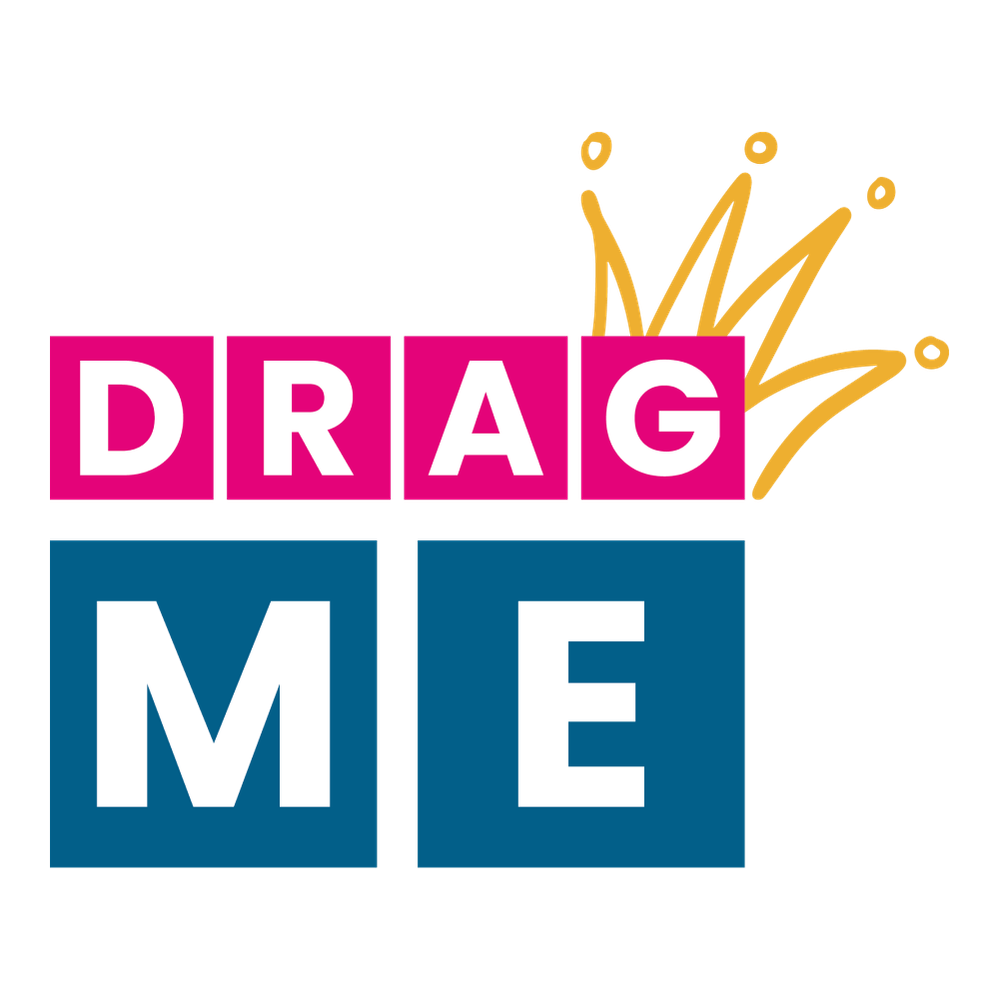

Author: Eleda Towle
What is the name of your company?
Triple Mountain, located in Hiram, Maine.
What do you do?
We are a niche collectibles business, catering to model horse collectors and LEGO™ collectors. We are a mom-and-pop business, but we ship models to collectors around the world. We sell both “regular” retail items and also vintage pieces on consignment, with an inventory of over 5,000 items.
Why did you choose to take the Pledge?
We were already donating 1% to charities using the Give & Grow app by Pledgify (through Shopify), as well as helping our local animal shelter and other local non-profits before we heard of Pledge 1%. We believe that businesses have the power to positively impact their communities and the responsibility to do so. We joined Pledge 1% as a way to be part of a community of like-minded businesses and as a way to display our pledge to customers.
If you could share one story about your company’s impact, what would it be?
There’s not one single “big” story I can share because a small business’s greatest impact is made in a series of small stories. As an animal-centric business, many of our impacts revolve around animals. As word came of horses and livestock trapped in the flood waters of Hurricane Harvey in 2017, we set up a fundraiser and donated 20% of our profits to the Texas Equine Veterinary Association, which spearheaded rescue efforts by boat and treated, fed, and housed animals they found until their owners could reclaim them. After the horrific attack in Lewiston, Maine, we donated all of our profits to the fund set up to help survivors and victims’ families with medical or burial costs.
We have a permanent consignment sales account set up for our regional animal shelter. Since 2016, people have donated model horses to the account, and when they sell, the proceeds have gone to the shelter, raising over $10,000 to date. The benefit of being a small business is that we can pivot quickly when there is a need and we can be ready to help within hours.
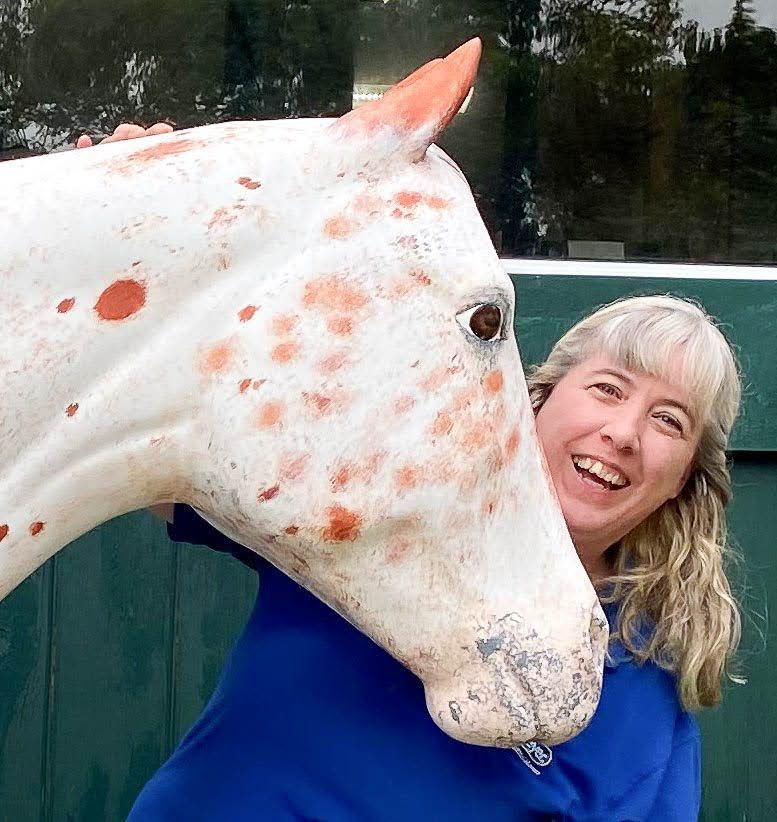
How do you measure the impact of your Pledge?
Being a mom-and-pop business, we don’t need to document or measure impacts like a corporation might; instead, we measure impact by the help we are able to offer our community. We visit many of the nonprofits we help, such as Harvest Hills Animal Shelter and Riding To The Top Therapeutic Riding Center, and see firsthand the ways our contributions are helping. It’s a great joy to have the means to help others.
What advice would you give to other small but mighty companies that are thinking about taking the Pledge?
If you have a small business, you are probably already active in your community. Why not put that love for your community into writing and use it in your marketing? As much as we help our neighbors in Western Maine, they return that kindness many-fold by shopping with us and spreading the word that our business helps area non-profits.

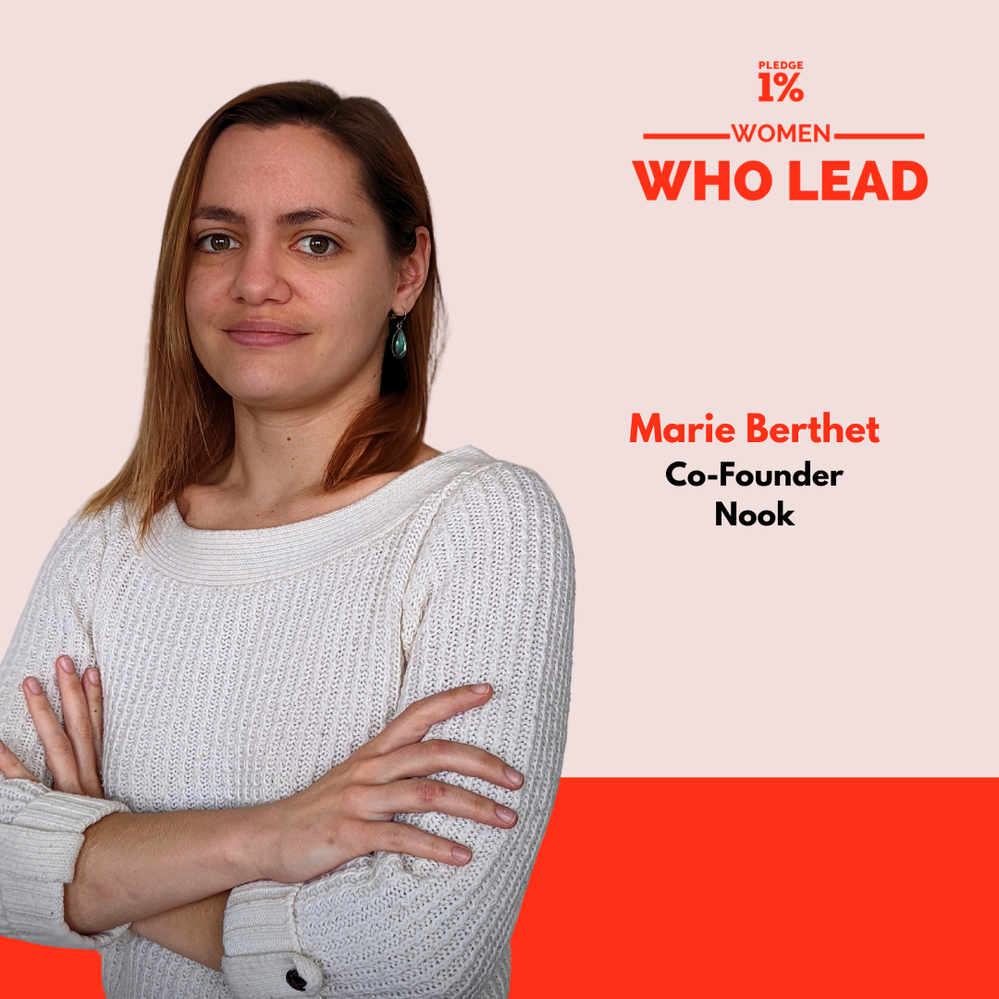
Marie Berthet
Co-Founder, Nook
Paris, France
If you could describe yourself in one word, what would that be and why?
Food. I love cooking (and eating), and I think sharing food is the best way to link with people. I often cook pastries for my co-workers and that’s a way to bring joy to the office (and motivate them to come). I always have some candy’s on my desk, and when I quit my last job my co-workers offered me my favorite candy’s (among many other beautiful things).
Pledge 1% provides a framework for businesses to do good. Do you think it’s important for today’s corporate leaders to prioritize social impact? If so, why?
It is so important to do good for businesses and that’s why Nook decided to participate into Pledge 1% program. The new generation is really affected by what’s happening in the world (global warming, gender equity, racism…), and showing them that their company cares about it and is involved into making things better can make a difference. They don’t work only for money anymore, they need to be part of something. As leaders, we must show the way and tell them that it is possible to change things and have a positive impact on the world.
Do you give back to the community with your team and work? If so, what does this look like?
We just created Nook this year, so we are still in the process of implementing the best way to give back to the community. We already identify some NGO’s that we’d love to work with, and we are defining the good balance between time and money in order to fits Nook’s convictions. Also as a Salesforce partner, we are really interested into using our knowledge and workforce to provide some CRM to NGO’s as there is a special program for that (NonProfit Cloud).
What’s the best piece of advice you’ve ever received?
Fake it until you make it. Once you get older, you can tell that most of people are doing things without knowing 100% of it. As a women, we are often afraid to take the lead and speak up (unless we are super confident that we know everything on the subject). So the best advice is : you know a good part of the subject that is discussed ? Don’t hesitate to take your part an explain what you think. Most of the people at the table don’t know more than you, so you don’t have to stay behind.
Once you get older, you can tell that most of people are doing things without knowing 100% of it.
This year’s International Women’s Day themes are focused on investing in women and inspiring inclusion. What can we do to make today’s workplaces more equitable and inclusive for women?
Women needs can be different from men needs. We can make small, really practical change, to make sure women feel good at the office. Make sure the heat is enough for women. As a study published in Nature Climate Change in 2015 shows, women needs in average 25°C to feel good instead of 22°C for men (whereas French Government recommended 19°C). We can also provide period day off, for the ones that are experiencing really painful period (and also, put some free pads in the restrooms !).
What advice do you have for women who are just starting their career?
Dream Big ! Make sure you are paid as much as your male colleagues, and don’t hesitate to speak up, ask for a raise, ask for a promotion. Don’t let anyone suggest that you won’t be able to do something because you are a women. Be proud of yourself and start building your self-confidence now. Make sure your hard work pay.
What are you looking forward to this year? Are there any goals (personal or professional), activities, or experiences you are excited about?
I’m really excited into Nook’s first year. I hope we will be able to sign great deals, and recruit a great team that will promote equity in any sense and will be happy to work together. And to eat some cakes, of course.
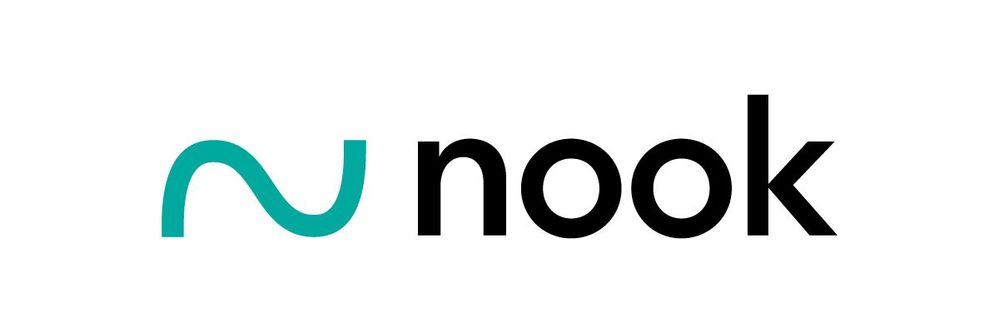
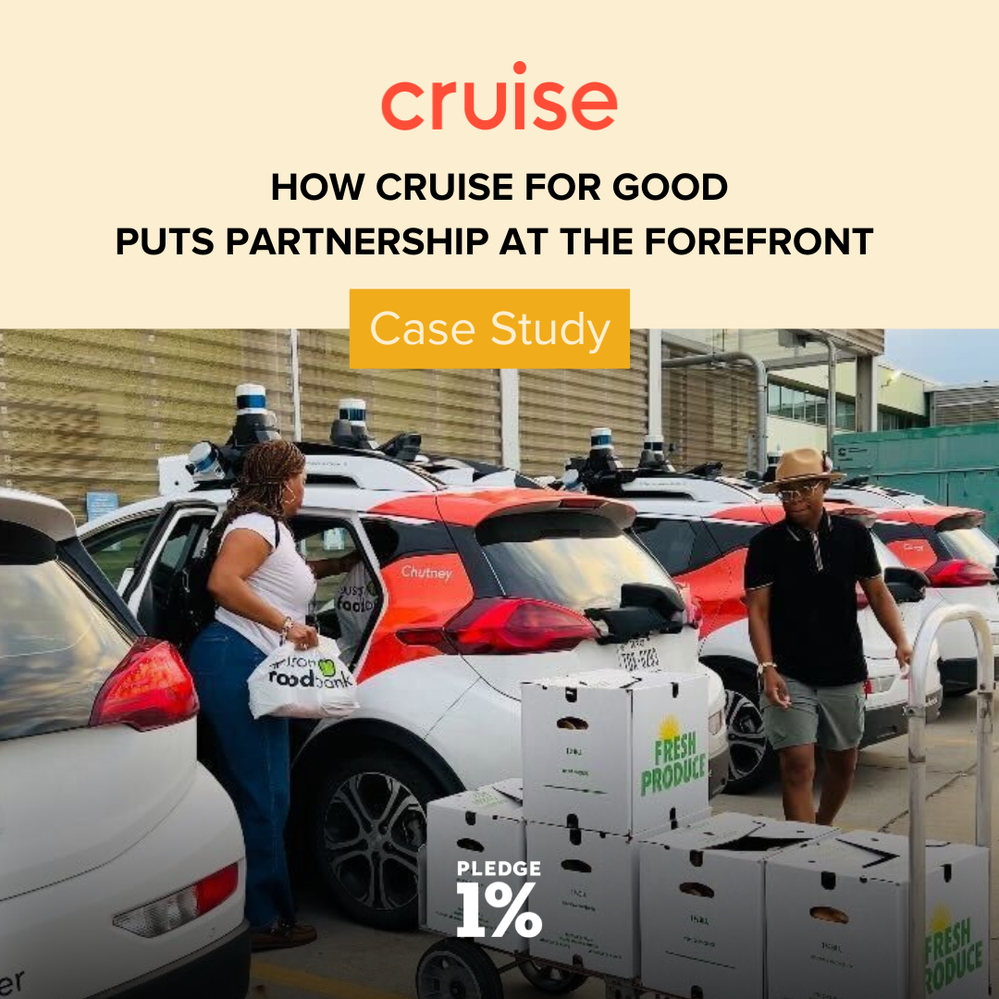
Cruise is an all-electric autonomous vehicle company building the world’s most advanced self-driving cars. In April 2021, Cruise formalized its signature social impact program, Cruise for Good, by joining Pledge 1% and pledging to use its fleet to serve local communities in need.
At the heart of their program is partnerships with local organizations and leaders who best know the communities they seek to serve. These partners have helped Cruise understand how to most effectively have a positive social impact. Recently, the company teamed up with the Houston Food Bank, to address food insecurity which affects 1 million Houstonitans.
Partners are also involved in the Cruise for Good Advisory Board, which informs Cruise’s social impact strategy and investments. The Board meets two times a year and also convenes in smaller working groups as needed to provide Cruise with direct and deep connections to the local communities they serve.
Partners can be a great resource for companies looking to formalize their social impact program. Read more about how this strategy has helped Cruise in their case study below.
Cruise-Case-Study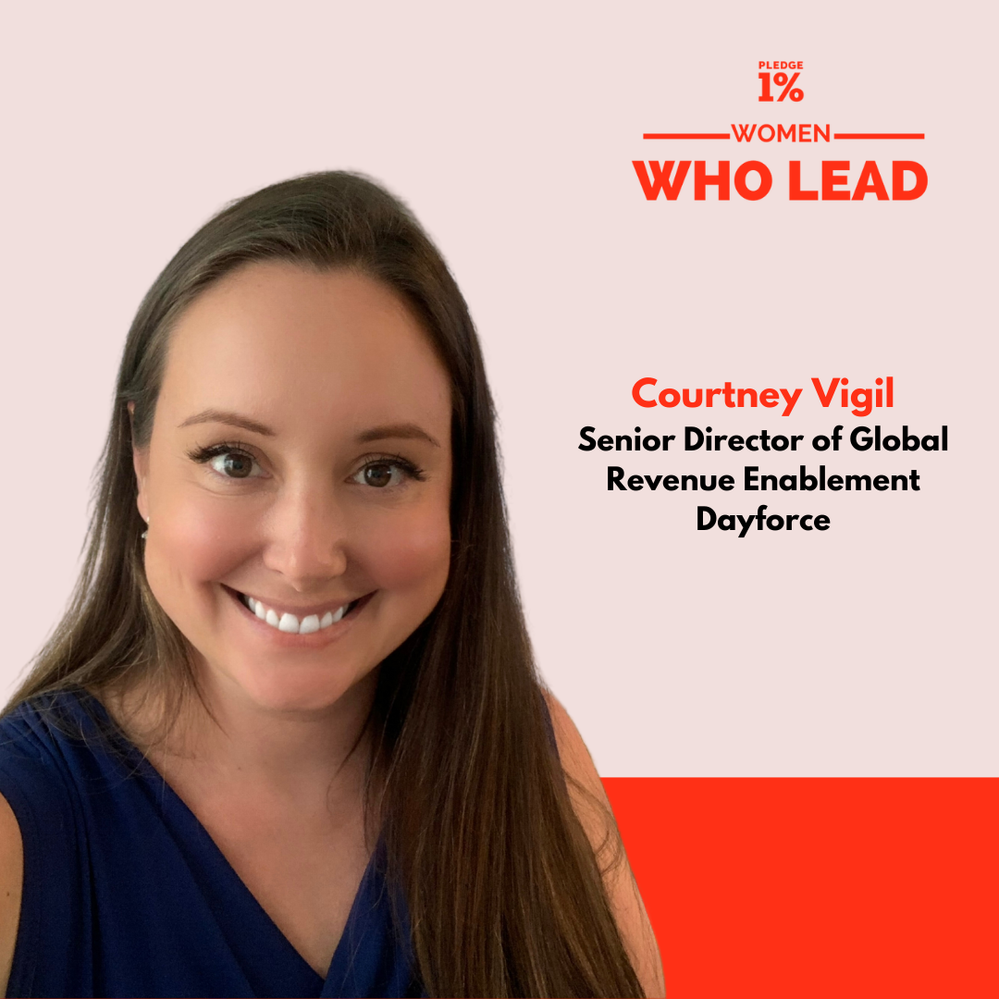
Courtney Vigil
Senior Director of Global Revenue Enablement, Dayforce
Raleigh, NC
If you could describe yourself in one word, what would that be and why?
Effervescent – I bring an enthusiasm and zest for life and it’s contagious.
Pledge 1% provides a framework for businesses to do good. Do you think it’s important for today’s corporate leaders to prioritize social impact? If so, why?
It is very important for companies to prioritize social impact. I’m proud to say Dayforce, my company, does this through an unlimited time away from work policy as well as volunteer days.
Do you give back to the community with your team and work? If so, what does this look like?
I served on the advisory board for Women in Sales. I’m a mentor to many women who wish to lead. I’m also an advocate for working mothers on LinkedIn with over 9K people who support my mission.
What’s the best piece of advice you’ve ever received?
The pursuit for work life balance is unattainable and will leave you feeling like a failure. Instead aim for harmony with your work and family life.
This year’s International Women’s Day themes are focused on investing in women and inspiring inclusion. What can we do to make today’s workplaces more equitable and inclusive for women?
This has a special meaning this year for me as I attempted to do the Global Executive MBA program at Duke. I have three children ages 1,4, and 14. I also have a career. The weight of all three responsibilities was too much and I had to end my goal of attaining my MBA at this time. While my workplace was very accommodating, the rigor of my MBA program left little accommodations for my role as a mother. I hope in the future that higher education would provide more accommodations for working mothers.
What advice do you have for women who are just starting their career?
Don’t be afraid to shine. Bring new ideas forward. Bring your generational strengths to your role. Trade your strengths for someone who is older and learn from each other.
Don’t be afraid to shine.
What are you looking forward to this year? Are there any goals (personal or professional), activities, or experiences you are excited about?
Searching for harmony in all the roles I have.
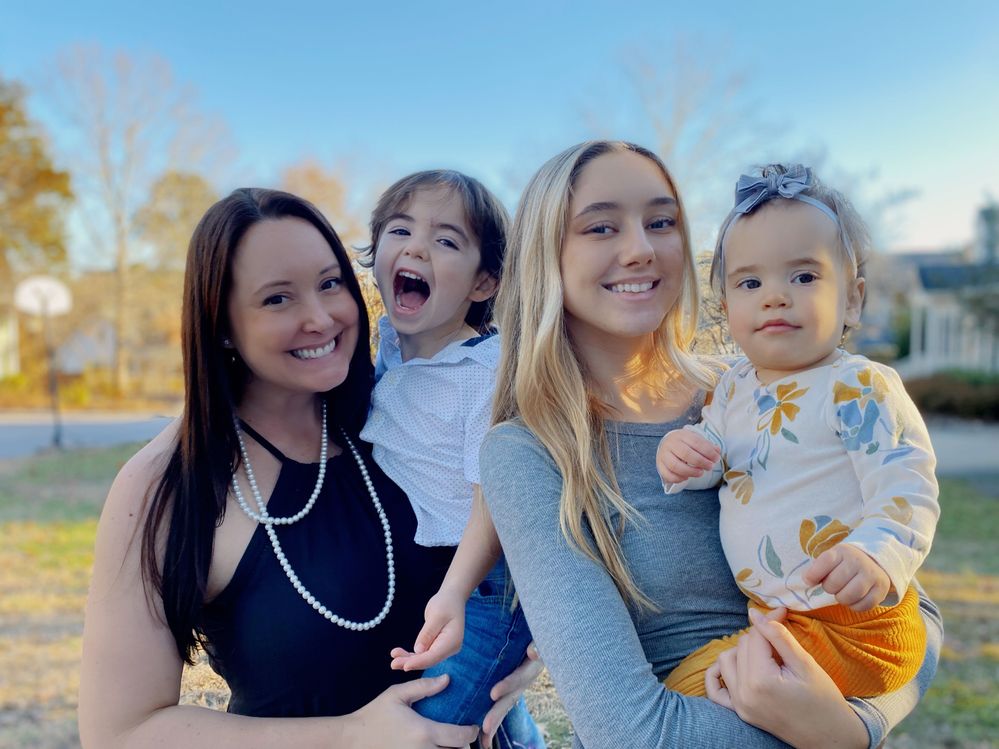
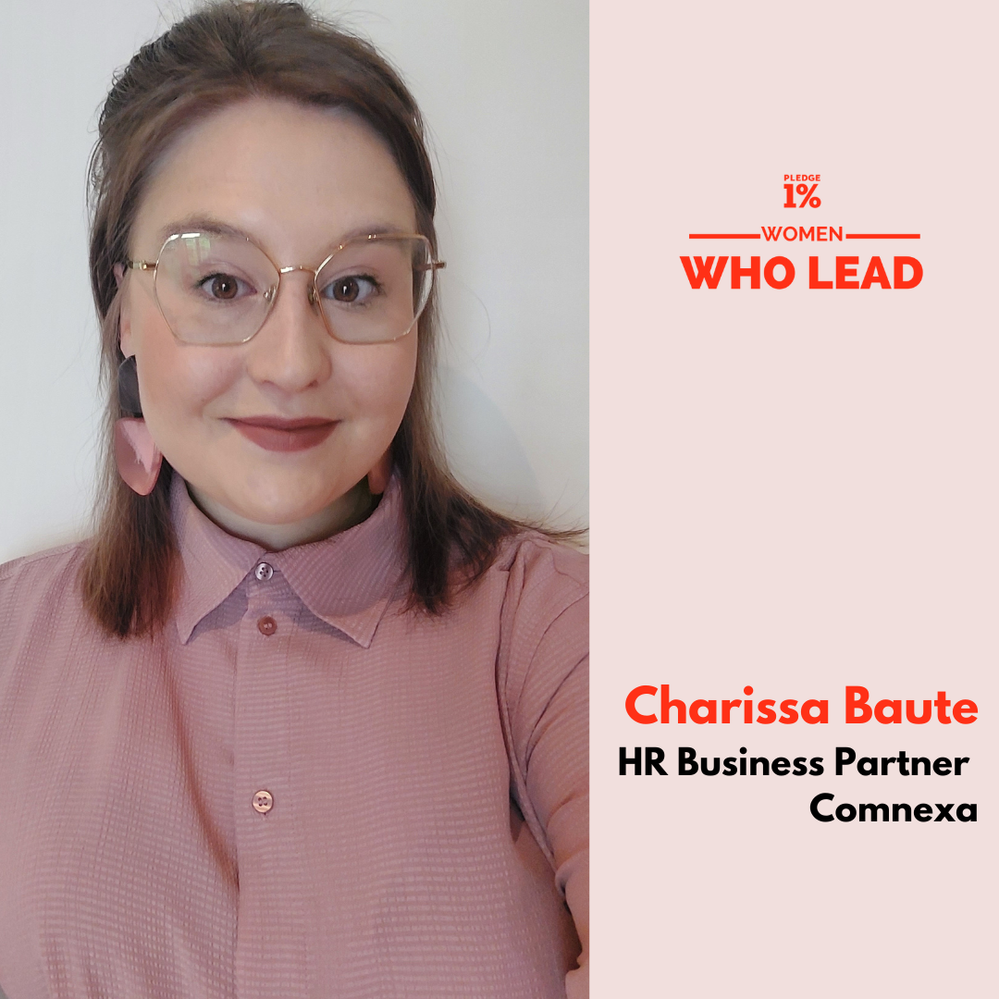
Charissa Baute
HR Business Partner, Comnexa
Lisbon area
If you could describe yourself in one word, what would that be and why?
One of the most heartening compliments I’ve received from my friends is being described as someone who exudes a lust for life, embodying the concept of “joie de vivre.” While it might not be a single word, it perfectly captures my philosophy of embracing opportunities with a “why not” mindset.
Over the past year, I set out on a journey to explore 30 new things before turning 30. This endeavor served as a beautiful reminder to keep my heart open to fresh adventures and wholeheartedly say yes to new experiences. It has been a delightful journey of self-discovery and an affirmation of the joy that comes from embracing life’s possibilities.
Pledge 1% provides a framework for businesses to do good. Do you think it’s important for today’s corporate leaders to prioritize social impact? If so, why?
Absolutely! Leading by example is a cornerstone of our values, particularly Trust and Innovation, and I am fortunate to be part of an organization where our partners actively champion social change. The emphasis on social impact not only propels innovation within our company but also motivates us to seek projects and opportunities aligned with that vision. I firmly believe that a steadfast commitment to positive social and environmental practices fosters loyalty and trust.
In today’s complex world, grappling with challenges like climate change, inequality, and poverty, our leaders emerge as influential forces capable of making a substantial impact. By weaving sustainable and socially responsible practices into our business strategy, we can contribute meaningfully to addressing these global issues.
Do you give back to the community with your team and work? If so, what does this look like?
One of the aspects I truly appreciate about Comnexa is the celebration of individuality in our workplace, which significantly enriches our organizational culture. Here, everyone is encouraged to freely champion various great causes, and it’s heartening to see Comnexa’s support for these initiatives.
The company maintains an open-minded approach to exploring diverse causes that contribute to the well-being of the broader community. Whether it’s backing a local sports team or actively participating in Movember and supporting women’s organizations in Jersey and Portugal, our commitment to making a positive impact is evident and inspiring.
What’s the best piece of advice you’ve ever received?
Embrace kindness and the power of presence. Each person is navigating their own journey, and a simple act of kindness can make a profound difference. Be generous with your kindness, and when someone needs your support, be fully present for them.
Embrace kindness and the power of presence.
This year’s International Women’s Day themes are focused on investing in women and inspiring inclusion. What can we do to make today’s workplaces more equitable and inclusive for women?
I strongly believe in the importance of maintaining an ongoing dialogue about these matters, whether it’s with our managers, friends, sisters, or colleagues. Let’s actively foster these conversations and embrace transparency when discussing the challenges we encounter. As an ally, I am committed to ensuring fair pay for women by consistently reviewing and addressing any gender pay gaps within the organization in collaboration with our partners.
Additionally, let’s establish mentorship programs to connect women with seasoned professionals who can offer valuable guidance and support. Let’s also continue on offering flexible work arrangements such as remote work options or flexible hours which helped women juggle their various roles. By championing these initiatives, we can create an inclusive and supportive workplace for everyone.
What advice do you have for women who are just starting their career?
Seek out a mentor who inspires you and make it a habit to regularly connect with them. This not only broadens your perspectives but also contributes to your growth as a professional.
Remember, your voice matters. Don’t hesitate to share your ideas and thoughts. They have the power to make a meaningful impact. Embrace the confidence to express yourself, as your unique perspective adds tremendous value.
What are you looking forward to this year? Are there any goals (personal or professional), activities, or experiences you are excited about?
As I approach the milestone of turning 30, I find myself reflecting on the multitude of experiences that have shaped me. Also, continue in developing a community of women around me as an “expat” in Portugal. I have met so many amazing open-minded women these past few years. The questions and acceptance that we are all seeking for are greatly answered by just meeting with them. While there are still a few adventures left on my 30-before-30 list, I look forward to the personal growth they will bring.
On a professional note, my goal is to further my journey with Comnexa and contribute to the creation of a great employee experience for our team. I’m excited about the opportunities ahead and the positive impact we can make together. Kicking it off with a well-deserved team trip for them all.
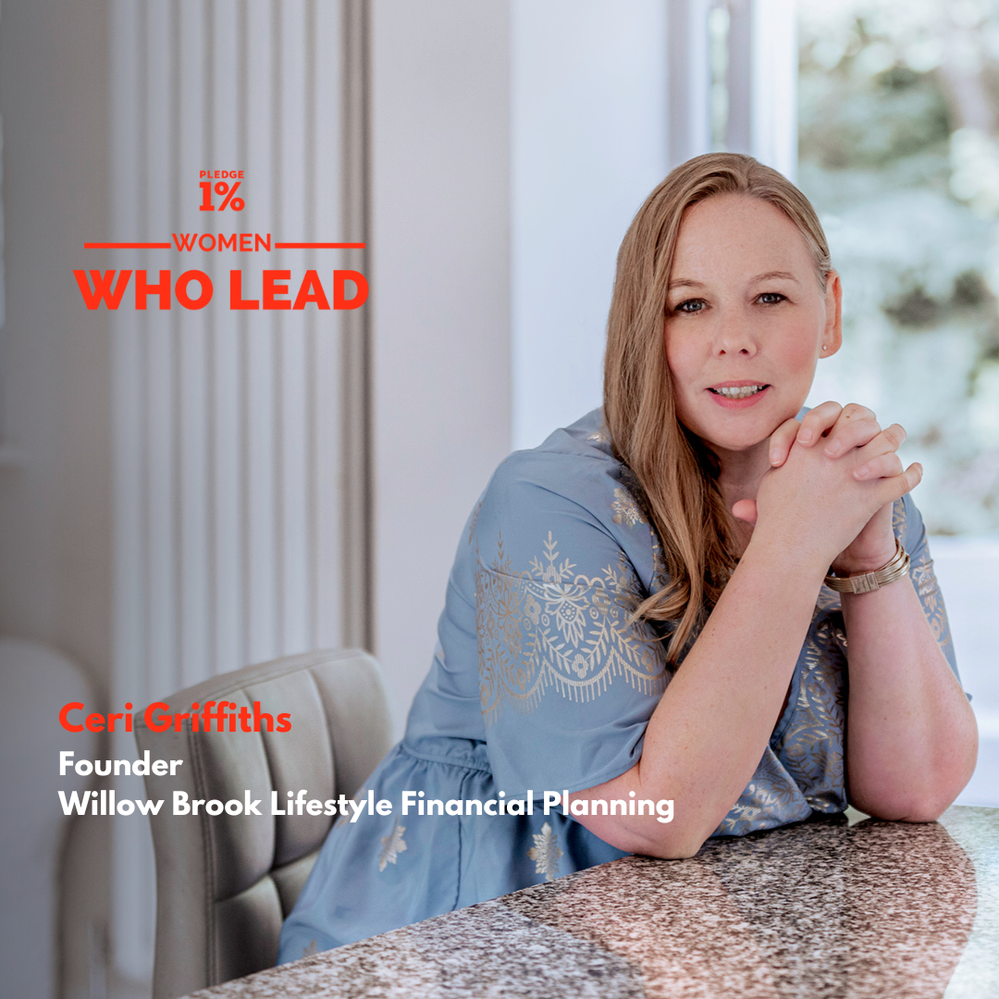
Ceri Griffiths
Founder, Willow Brook Lifestyle Financial Planning
Virtual/remote
Pledge 1% provides a framework for businesses to do good. Do you think it’s important for today’s corporate leaders to prioritize social impact? If so, why?
At its core, prioritising social impact is about doing the right thing. It’s a reflection of a basic human principle: caring for others and supporting those less fortunate. In a world marked by significant inequalities and environmental challenges, the role of businesses in society extends far beyond generating profits. We have the resources, reach, and influence to make a meaningful difference in people’s lives and the health of the planet.
When companies commit to social responsibility, they demonstrate that success is not solely measured by financial achievements but also by the positive changes they bring to the world. This approach fosters a culture of kindness, empathy, and support, values that are crucial in today’s society. It’s about leading by example, showing that it’s possible to be both successful and ethical, and encouraging others — from individuals to other businesses — to contribute to societal well-being.
Moreover, being a role model in this way has a ripple effect. It inspires employees, customers, and other stakeholders to take action themselves, whether through volunteering, philanthropy, or making more socially responsible decisions in their personal and professional lives. This collective action can lead to significant societal change.
Do you give back to the community with your team and work? If so, what does this look like?
Yes, we support via B1G1, which provides us with a Platform for Good and structure which allows us to create ‘when this …then this’ processes directly into our business.
For example, when a new client joins us then an automatic donation is made on their behalf (in that instance to provide 365 days of access of clothing for girls rescued from sex trafficking in India).
Birthdays, Christmas and key milestones are all linked to different causes. As well as thank you for referrals.
It means every day we can show up and do good for others with ease, and with confidence that they are benefiting from the full value of the donations.
What’s the best piece of advice you’ve ever received?
To notice the glimmers in life. Many of us are increasingly aware of our triggers, and understanding those and what causes them is such a healing way to move forward. But don’t forget the glimmers. The moments in life that make your heart sing – and be sure to repeat them, notice them, be grateful for them. The more you do this, the better life truly gets.
To notice the glimmers in life.
What advice do you have for women who are just starting their career?
Don’t be scared to talk about money. We have huge money silence in our culture. Know that it is absolutely ok to ask what your peers are paid and to ask what other levels are paid. Knowledge is vital – knowing the worth of your role is key. Also – pay as much as you can as soon as you can into your pension. This is a gift to your future self, the money you can put in during the early years has such a huge impact due to the years it has to grow. It is a gamechanger!!!
What are you looking forward to this year? Are there any goals (personal or professional), activities, or experiences you are excited about?
Our commitment has always been to ensure every client feels seen and heard, particularly during the challenging times of divorce. We’re proud of the support system we’ve built, recognised for its understanding and responsiveness. Now, we’re excited to build on this strong foundation with some new initiatives that promise to take our service to the next level.
Starting with an expert-led in-person client focus group this month, we’re deepening the dialogue with our clients. This isn’t about reinventing the wheel; it’s about adding layers to our already robust support, ensuring we’re as in tune with our clients’ needs as possible.
Then, by rolling out a larger virtual focus group, we’re widening the net to capture a broader range of insights, making sure no voice goes unheard. This effort to gather more feedback is about refining what we do, ensuring our support is not just reactive but proactive, perfectly aligned with what our clients really need.
With these steps, plus targeted feedback from solicitors, we’re on a path to make our good service great, enhancing how we support every woman who turns to us. It’s about recognising what works, improving where we can, and always striving to be the best in our field.